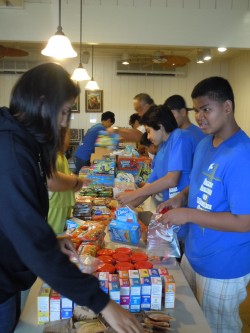Sunshine in a Bag
Initiative addresses child hunger
While most children on Molokai fall asleep every night with a full stomach and go to school well-nourished, there are some who don’t. To help combat child hunger, the St. Damien Catholic Parish is spearheading an effort to provide food to elementary students in need, as well as assist families in creating a sustainable backyard garden.
Starting last Friday, the Sunshine Backpack and Ohana Garden project, or Kukunaokala, will distribute backpacks of food twice a month to selected students at Kilohana, Kaunakakai and Kualapu`u schools. Students are chosen for participation based on referrals from school staff, and parents must give permission for their children to receive a backpack. Thirty bags were packed with breakfast, lunch and dinner items by St. Damien youth ministry members and distributed to assist a total of 64 children on Molokai.

St. Damien Parish youth ministry members stuff backpacks with food to combat child hunger in Molokai elementary schools. Photo by Catherine Cluett
“It’s been proven by statistics that [child hunger] is a problem on Molokai,” said Leoda Shizuma, St. Damien Parish social ministry coordinator. “We’re hoping by addressing this we’ll be able to set our children up for success.”
Hungry Truth
For some students, the only good meals they eat are those served at school, according to Kualapu`u School nurse and St. Damien parishioner Nohea DePonte. To help ensure these students get adequate food over the weekend, the backpacks will be distributed every second and fourth Friday of every month. Students will then return the bags the following Monday to be refilled the next time.
“Kids come in [to the nurse’s office] with a sore stomach, but actually they’re hungry,” said DePonte. “I hope this opens [parents’] eyes and for them to see we’re trying to help by lending a hand.”
The pilot program is made possible through community partnerships, donations and financial assistance from the Catholic Diocese of Honolulu.
“[We’re providing] simple food that kids can make themselves so they don’t come to school Monday morning super hungry,” said Iwie Tomashiro, director of the office of social ministry at the Diocese. “But it’s not something St. Damien Church alone can provide the answer for. We’re hoping it can bring community together.”
“It’s a critical issue people don’t really talk about,” said Kimberly Svetin, a parent and president of Molokai Drugs, one of the community sponsors of the Sunshine project. “When our students don’t have enough to eat, they cannot perform in the classroom. It’s a basic need, and we need to make sure all of our students have enough.”
Last Thursday, the Damien Center was a flurry of activity as youth ministry participants gathered food supplies — from fruit cups to ramen noodles — and packed it into backpacks according to how many children are in the family that would receive the bag.
“[I’m doing this] to give back to the community and think about others rather than myself,” said Kori-Lee DeRouin, a freshman at Molokai High School. “I’m lucky enough that my parents can provide for me and I can be happy with what I have.”
Similar initiatives to address hunger prevention already exist at Molokai Middle and High schools. Known as Random Acts of Kindness at MMS and Food for Thought at MHS, these snack programs, also supported by the Catholic Church, make sure students don’t go hungry. Backpack programs like Kukunaokala have already shown success on Maui and Oahu, with improved grades among recipients as well as reduced incidents of theft among youth.
Sustainable Gardens
In addition to providing ready-to-eat food, Tomashiro said Molokai’s Sunshine program is also about education. Parents who give permission for their children to receive a backpack also agree to participate in the Ohana Garden portion of the initiative. In the near future, parish members will meet with families to distribute seedlings grown behind St. Damien Church and provide education about establishing a successful backyard garden.
Michael Kelly, priest in residence at St. Damien Parish, said the plot behind the church, called the St. Damien Garden, exemplified the efforts of Molokai’s second saint. St. Marianne was instrumental in taking care of the land and planting gardens for Hansen’s disease patients in Kalaupapa.
“The backpacks take care of immediate needs, but gardens are more sustainable” to provide food for the students and their families in the long term, said Tomashiro.
“The concept of the Ohana Garden is a really important piece of the puzzle,” said Jennifer Whitted, parent community network coordinator at Kaunakakai School. “It not only helps create small sustainable food sources directly for our island’s families, but also teaches an important lesson of responsibility for parents and their keiki.”
In the future, Tomashiro said organizers also hope to start a community harvest program on Molokai in which families can grow and together.
A Full Future
While limited resources currently restrict the number of backpacks that can be distributed, Tomashiro said the goal is to provide 100 backpacks each distribution as the program grows, for approximately 25 bags per elementary school on the island.
Shizuma said the program will continue at its current capacity until the end of the school year, and organizers will regroup over the summer and gather additional community support to continue in the fall.
Already, the initiative has received donations from individuals and businesses, including Misaki’s, Molokai Drugs, the Maui County Area Health Center and others.
“We’re hoping that more community partners would like to participate through donations or volunteering,” said Shizuma. Contact St. Damien Parish to find out more.











Don't have a Molokai Dispatch ID?
Sign up is easy. Sign up now
You must login to post a comment.
Lost Password